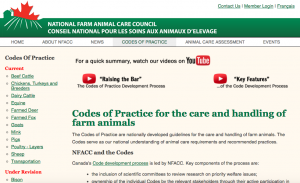Managing the environment in which the animal is in by providing enrichments and altering the way husbandry care are provided can decrease stereotypies among farm animals (Mason et al., 2007). In fact, environmental enrichments encourage animals to express more natural behaviors (e.g foraging) and spend less type expressing stereotypical ones (Mason et al., 2007). Moreover, by being exposed to a natural environment the cortisol level in the animal’s system will decrease, leading to a lower probability of stereotypies caused by stress (Mason et al., 2007). Additionally, the farmer can decrease the chances of the ability of animals to predict when their food is coming, by changing the method of delivery. Overall, this will decrease the tendency of oral stereotypies. Downside: Additional costs for the farmer to improve housing.
For ideas on how to improve the management practices you can check out the National Farm Care Council (NFACC) Codes of Practices
